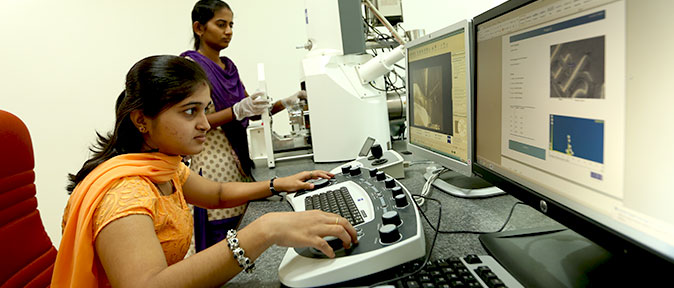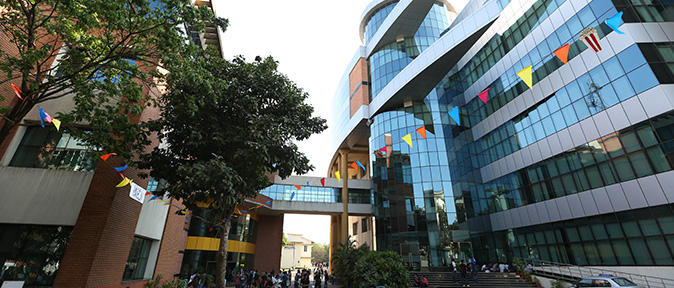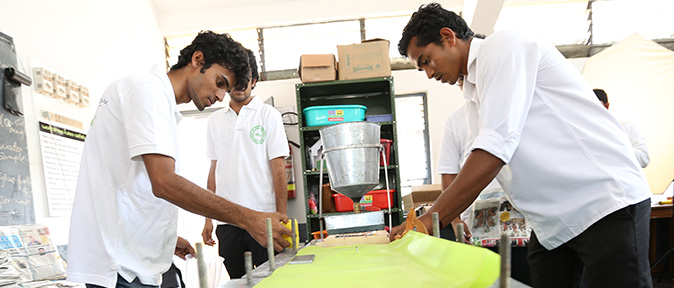Data Science and Engineering - Overview
Program Description
The B.Tech program in Data Science & Engineering trains engineering graduates to be skilled Data Scientists. The emphasis is on core data science subjects along with the related computational mathematics, statistics, and computer science subjects.
Focus
Data Science is a unique multidisciplinary confluence of Computer Science, Computational Mathematics, Statistics and Management. Data engineering involves data collection methods, designing enterprise data storage and retrieval. The core data science subjects focus on data analytics, visualization, predictive modeling and analytics for data-driven decision making. Knowledge representation, machine learning, artificial intelligence, deep learning will be taught with relevant case studies. The students can study industry-specific, custom-designed program electives on blockchain technologies, quantum computing, data forensics, data privacy, algorithmic trading, and data security. Students can also opt for a minor specialization in either business, finance or healthcare analytics.
Career Prospects
The Institution’s placement cell, industry collaborators, and alumni network will facilitate placement and internships as data scientists, data analysts, and data engineers. The course targets placements and internships in top data science companies like CapGemini, Cartesian Consulting, Oracle, Publicis Sapient, Wipro Ltd, and in domains such as finance, business, economics, and healthcare. The Institution has also tied up with foreign universities and promotes a semester abroad.
Highlights of BTech Data Science & Engineering
· One of India’s first B.Tech Programs in Data Science & Engineering
· Core Competency in Data Science, Computational Mathematics and Statistics
· Industry collaboration for the teaching-learning process
· The option of Integrated Master’s Program with foreign universities
Program Educational Objectives (PEOs)
Data Science and Engineering graduates will be able to:
PEO1. Demonstrate technical competence in the area of data science
PEO2. Analyse , innovate and pursue research and development in the field of data science and engineering
PEO3. Work in multi disciplinary environments and adapt to the changing needs of the society
PEO4. Communicate effectively, display leadership skills and demonstrate professionalism and ethical behavior
PEO5. Engage in lifelong learning, apply the knowledge judiciously and remain continuously employable
A. PROGRAM OUTCOMES(POs)
Engineering Graduates will be able to:
1. Engineering knowledge: Apply the knowledge of mathematics, science, engineering fundamentals, and an engineering specialization to the solution of complex engineering problems.
2. Problem analysis: Identify, formulate, review research literature, and analyze complex engineering problems reaching substantiated conclusions using first principles of mathematics, natural sciences, and engineering sciences.
1. Design/development of solutions: Design solutions for complex engineering problems and design system components or processes that meet the specified needs with appropriate consideration for the public health and safety, and the cultural, societal, and environmental considerations.
2. Conduct investigations of complex problems: Use research-based knowledge and research methods including design of experiments, analysis and interpretation of data, and synthesis of the information to provide valid conclusions.
3. Modern tool usage: Create, select, and apply appropriate techniques, resources, and modern engineering and IT tools including prediction and modeling to complex engineering activities with an understanding of the limitations.
4. The engineer and society: Apply reasoning informed by the contextual knowledge to assess societal, health, safety, legal and cultural issues and the consequent responsibilities relevant to the professional engineering practice.
5. Environment and sustainability: Understand the impact of the professional engineering solutions in societal and environmental contexts, and demonstrate the knowledge of, and need for sustainable development.
6. Ethics: Apply ethical principles and commit to professional ethics and responsibilities and norms of the engineering practice.
7. Individual and team work: Function effectively as an individual, and as a member or leader in diverse teams, and in multidisciplinary settings.
8. Communication: Communicate effectively on complex engineering activities with the engineering community and with society at large, such as, being able to comprehend and write effective reports and design documentation, make effective presentations, and give and receive clear instructions.
9. Project management and finance: Demonstrate knowledge and understanding of the engineering and management principles and apply these to one’s own work, as a member and leader in a team, to manage projects and in multidisciplinary environments.
10. Life-long learning: Recognize the need for, and have the preparation and ability to engage in independent and life-long learning in the broadest context of technological change.
B.PROGRAM SPECIFIC OUTCOMES (PSOs)
PSO1: Demonstrate the understanding of mathematical, statistical and AI techniques in the field of data science
PSO2: Design and develop effective solutions using data analytics, visualization and artificial intelligence
PSO3: Apply data science techniques in domains such as business, finance and health care
Key Dates & Deadlines
15
Mar 15 26
Mar ' 26
Last date to Apply
'
Tentative Course Commencement Date
Indian Students Apply
Manipal Academy of Higher Education not only caters to one’s academic needs, but also lays emphasis on all-round development of its students.
International Students Apply
Manipal Academy of Higher Education not only caters to one’s academic needs, but also lays emphasis on all-round development of its students.
Indian Students Apply
Manipal Academy of Higher Education not only caters to one’s academic needs, but also lays emphasis on all-round development of its students.
International Students Apply
Manipal Academy of Higher Education not only caters to one’s academic needs, but also lays emphasis on all-round development of its students.
Course Outline for BTech DataScience and Engineering
Data Science Course Duration
4 Years (8 semesters).
Facilties

Laboratories
World-class laboratories give learning a practical dimension

Innovation Centre
State-of-the-art Innovation Centre to facilitate multi-disciplinary research

Libraries
Libraries have excellent resources for reference and study

MUTBI
Paper tree - A green initiative by MIT students of MUTBI

Computing Facility
Wi-fi campus with modern computing and digital facilities





